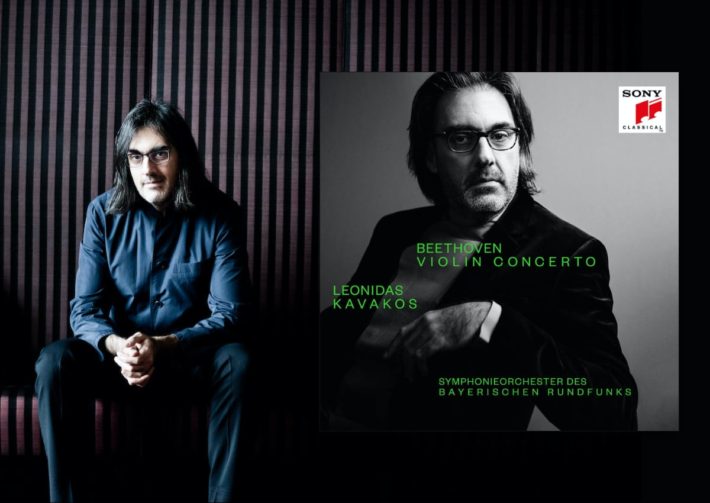‘Beethoven mania’ continues in this insatiable frenzy for labels to endlessly issue new recordings for the forthcoming composer’s anniversary. Another violin concerto comes fast on the heels of Christian Tetzlaff’s outstanding and insightful rendition with Robin Ticciati and the Deutsches Symphonie-Orchester Berlin, reviewed in these pages. In this case, Leonidas Kavakos directs the Symphonieorchester des Bayerischen Rundfunks from the violin. Tetzlaff pairs his with the Sibelius concerto, Kavakos completes his album with a trio of Beethoven’s chamber works — the early septet op. 20 and two late settings of folksongs variations from Op.105 and 107.

Across all the three movements of the concerto, Kavakos’ performance is one of the most expansive on record. Taking the composer’s marking of allegro ma non troppo, the tempo is very broad. Decreased speed allows for greater rhythmic clarity such as the juxtaposition of semi-quavers and triple quavers passages. Contrasts of piano and forte from Kavakos’ bow are subtle, but this is a part of his style, as illustrated in his Brahms sonatas album with Yuja Wang. The cadenza chosen is the one based on the piano transcription of the work, with timpani. Kavakos elaborates with extra by adding multiple stops and double trills, sending the levels of virtuosity required to play this into the stratosphere.
Taking almost three minutes more than Tetzlaff, there is a different feel to the Larghetto central movement altogether, as Kavakos creates a stillness with his tempo, which is closer to an adagio. A mostly convincing rendition, Kavakos is so engrossed that there are momentary losses of orchestral direction and whilst taking liberties at the end of phrases, he occasionally holds the last note slightly longer than indicated. The third movement, marked allegretto, is again broad. Tetzlaff’s brisker speed has a two-in-a-bar feel, whilst Kavakos’ 6/8 meter is strongly pronounced. The two cadenzas at bar 99 (2’21”) and bar 278 (7’37”) are substantial, and are more succinct in Tetzlaff’s version.
Kavakos’ beautifully shaped phrases dovetail with those of the orchestra with a melodious and lyrical tone and a gentle vibrato. Some may find the orchestral palette of a previous age, the large body of strings creates a richness with a warm sonority, vibrato matching the color, but not the intensity of Kavakos’. Textures are clear and distinguishable, Sony’s engineering allows clarity with beautifully balanced woodwind — especially the bassoons.
The septet op. 20 for clarinet, French horn, bassoon, violin, viola, cello and double bass, a huge success for the young Beethoven, is a relative rarity today. Kavakos, with the principals of the Symphonieorchester des Bayerischen Rundfunks, give a sophisticated performance of this work. Each of the six movements is aptly paced, with more articulate playing and contrasting dynamics than the concerto. The balance between the players is good, though Kavakos occasionally dominates, in the first and fifth movements especially, when wind players have more significant musical ideas. The Nash Ensemble have similar tempos to Kavakos, but with greater equality between the players (though their older recording lacks the clarity and atmospheric acoustic). Throughout the work, the players bring a sense of unity, which would have provided an appropriate end to the album.
But there’s more: five sets of variations based on folksongs follow — the third set from Op. 105 and four sets from Op. 107. In these Kavakos is joined by pianist Enrico Pace. Whilst variations are stylistically played with a sense of fun, they feel misplaced after the septet and bring the album to an anticlimactic conclusion.
Kavakos in the concerto and piano variations is recorded slightly too close for comfort, but the overall balance is very good. Recording locations are well-chosen with enhancing acoustics. Kavakos’ Beethoven concerto is in the same vein as Brahms, leaden with romanticism. He brings a distinction which may be too slow for some, but is considered and executed with certainty nonetheless. For a slimmer tone overall, with vibrancy and a more exciting approach, Tetzlaff is preferable, with cadenzas which are more stylistic and who’s orchestra benefit from Ticciati’s imaginative conducting.
Image: ©️ Marco Borggreve
Beethoven – Violin Concerto, Septet, Variations Op. 105, 107
Symphonieorchester des Bayerischen Rundfunks
Leonidas Kavakos – Violin, Conductor
Sony Classical, CD 19075929882




















